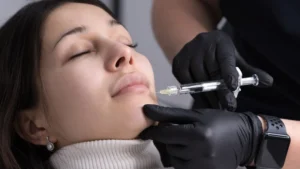Imagine feeling a sudden spinning sensation that makes the world around you seem like it’s in motion, followed by waves of heat and sweat rushing over your body. This intriguing combination of symptoms raises a question: “Can Vertigo Cause Hot Flashes?”
Delving into this topic is like peering into the intricate workings of our bodies. Understanding whether there’s a connection between these two seemingly unrelated experiences can offer insights into how our inner mechanisms might be interlinked.
Exploring this potential relationship matters because it could shed light on shared pathways within us, potentially offering better ways to manage these discomforts.
Defining Vertigo
Vertigo isn’t just a word; it’s a sensation that can turn your world upside down. It’s the feeling of spinning, swaying, or tilting, even when you’re standing still.
This disorienting experience isn’t a simple matter; it’s a complex interplay of signals within your body.
Causes of Vertigo
Vertigo doesn’t appear out of nowhere; it has triggers. One common trigger is benign paroxysmal positional vertigo (BPPV), often caused by tiny calcium particles unsettling the inner ear balance.
Other causes include Meniere’s disease, which involves fluid buildup in the inner ear, and vestibular migraines that disturb the brain’s balance centers.
Exploring Hot Flashes
Hot flashes are like sudden waves of warmth that sweep over your body, leaving you feeling like you’re standing too close to a blazing fire. It’s not just about feeling hot; it’s an internal rush of heat that can make you break out in sweat.

Can Vertigo Cause Hot Flashes?
Inner Ear’s Dual Role
The inner ear is a marvel with multiple responsibilities. Not only does it contribute to our sense of balance, but it also has a hand in temperature regulation.
Imagine it as a control center, processing signals from different parts of the body.
Read Also: Menopause and Anger Toward Husbands: All You Need to Know
Nervous System Nexus
Your nervous system is like a complex communication network. It connects your body’s various systems and relays messages back and forth. In the case of vertigo and hot flashes, this network might hold the key to their possible connection.
Shared Pathways
While vertigo and hot flashes might seem worlds apart, they might share secret pathways. Think of it as different roads converging onto a common intersection.
Disruptions in the inner ear and nervous system could potentially impact both balance and temperature regulation.
The Research Puzzle
Researchers have been piecing together this intricate puzzle. Studies suggest that certain conditions affecting the inner ear might coincide with changes in temperature perception.
This doesn’t give us a complete picture, but it hints at the possibility of a connection.
Individual Variations
It’s important to remember that everyone’s body is unique. Just as fingerprints differ, the way vertigo and hot flashes interact can vary.
Some individuals might experience both symptoms together, while others might not notice a clear relationship.
Medical Perspectives
When it comes to exploring the possible link between vertigo and hot flashes, medical experts have diverse opinions.
Imagine a room filled with doctors sharing their thoughts. Some believe that the intricate web of connections within the body could indeed intertwine vertigo and hot flashes.
Inner Ear’s Dual Role
Picture an expert explaining how the inner ear’s role in balance might interact with temperature control.
The same system that helps us stand steady might also influence how our body perceives and regulates heat.

Hormones and Nervous System
Doctors point to the intertwined role of hormones and the nervous system. They’re like partners in crime, influencing various bodily functions.
Changes in hormone levels might impact both the inner ear’s function and the body’s temperature regulation.
Read Also: How to Boost Immune System during Menopause?
Limited Evidence
While some research hints at a potential connection, the evidence isn’t yet crystal clear. It’s like putting together a jigsaw puzzle with a few missing pieces.
This uncertainty underscores the need for more rigorous studies to decipher the true relationship.
Individual Cases
Each person’s experience is unique. Just as no two fingerprints are alike, how vertigo and hot flashes interact can vary widely.
Some individuals might experience both symptoms together, while others might find no apparent correlation.
Consultation and Evaluation
For anyone experiencing either or both symptoms, seeking medical advice is crucial. Doctors can conduct thorough evaluations, considering various factors such as medical history and symptoms.
Accurate diagnosis guides proper treatment and management strategies.
Conclusion
In the quest to understand whether Vertigo Can Cause Hot Flashes, we’ve delved into the fascinating interplay of our body’s intricate systems.
While the exact relationship between these two sensations isn’t fully elucidated, the potential connections between the inner ear, nervous system, and hormonal balance provide insights into how our body orchestrates these experiences.
By exploring personal stories, medical perspectives, and possible links, we uncover a narrative of resilience, adaptation, and the pursuit of relief.
Individual experiences vary, emphasizing the importance of seeking medical advice tailored to each person’s unique situation.
As medical research continues, the puzzle of vertigo and hot flashes might become clearer, guiding effective approaches to diagnosis and management.
Through shared experiences and medical insights, this exploration empowers individuals to navigate the challenges posed by these distinct yet interconnected sensations.
FAQs
1. Can vertigo and hot flashes occur simultaneously?
Yes, some individuals may experience both vertigo and hot flashes, though the relationship between these symptoms isn’t fully understood.
2. Are men affected by hot flashes as well?
Yes, while hot flashes are commonly associated with menopause, men can also experience them due to hormonal imbalances or medical conditions.
3. Is there a definitive test to diagnose vertigo and hot flashes?
Diagnosing vertigo and hot flashes requires a comprehensive evaluation by a healthcare professional, including medical history, physical examinations, and possibly additional tests.
4. Can stress trigger both vertigo and hot flashes?
Yes, stress can influence hormonal balance and the nervous system, potentially contributing to the occurrence of both symptoms.
5. Are there effective treatments for vertigo and hot flashes?
Treatment approaches vary based on the underlying causes. Consultation with a healthcare provider is crucial to determine appropriate treatment options.
6. Are there lifestyle changes that can alleviate these symptoms?
Yes, lifestyle adjustments such as stress management techniques, dietary changes, and avoiding triggers can help manage both vertigo and hot flashes.
7. Do medications exist to relieve vertigo and hot flashes simultaneously?
Medications might be prescribed based on the underlying causes and the individual’s overall health. Consult a healthcare professional for personalized recommendations.
8. Can vertigo and hot flashes impact emotional well-being?
Yes, the unpredictable nature of these symptoms can lead to emotional stress and anxiety. Seeking support from healthcare professionals and support groups is important.
9. Are research studies ongoing to understand the relationship between vertigo and hot flashes?
Yes, ongoing research aims to uncover the intricate connections between the inner ear, hormones, and nervous system that may contribute to the co-occurrence of vertigo and hot flashes.
Medical References
- Smith, P. F., & Darlington, C. L. (2013). Vestibular contributions to cognition and the processing of cognitive load. Frontiers in Neurology, 4, 21.
- Thurston, R. C., & Santoro, N. (2017). Menopausal symptoms and cardiovascular disease risk. Menopause, 24(12), 1360-1362.
- Bhattacharyya, N., Gubbels, S. P., Schwartz, S. R., Edlow, J. A., El-Kashlan, H., & Fife, T. (2017). Clinical practice guideline: Benign paroxysmal positional vertigo (update). Otolaryngology-Head and Neck Surgery, 156(3_suppl), S1-S47.







